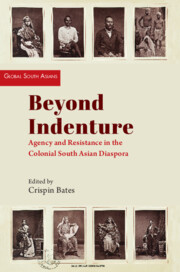Book contents
- Frontmatter
- Dedication
- Contents
- List of Figures and Tables
- Acknowledgements
- Introduction
- I Agency and Resistance
- 1 Negotiating Power in Colonial Natal: Indentured Migrants in Natal, 1860–1911
- 2 Stewed Plums, Baked Porridge and Flavoured Tea: Poisoning by Indian Domestic Servants in Colonial Natal
- 3 Labour Resistance in Indenture Plantations in the Assam Valley
- 4 A Forgotten Narrative of the Satyagraha Campaign: The Treatment of Prisoners between 1907 and 1914
- 5 Toilers across the Seas: Racial Discrimination and Political Assertion among Sikhs in Canada
- II Remigration
- 6 The Remigration of Hindostanis from Surinam to India, 1878–1921
- 7 Not So Anchored: The Remigration of Indians within the Caribbean Region
- 8 On the Move: Remigration in the Indian Ocean, 1850–1906
- III Gender and Family
- 9 Intimate Lives on Rubber Plantations: The Textures of Indian Coolie Relations in British Malaya
- 10 Labouring under the Law: Exploring the Agency of Indian Women under Indenture in Colonial Natal, 1860–1911
- 11 Gujarati ‘Passenger Indians’ in the Eastern Cape since 1900: Business, Mobility, Caste and Community
- 12 The Eurasian Female Workforce and Imperial Britain: Harnessing Domestic Labour by People of Mixed Racial Descent
- IV Legacies
- 13 After the Long March: Colonial-Era ‘Relief’ for Burma Indian Evacuees in Visakhapatnam District, 1942–1948
- 14 Opposing the Group Areas Act and Resisting Forced Displacement in Durban, South Africa
- 15 Indo-Fijians: From Agency to Abjection
- 16 New and Old Diasporas of South South Asia: Sri Lanka and Cyber-Nationalism in Malaysia
- About the Contributors
- Index
10 - Labouring under the Law: Exploring the Agency of Indian Women under Indenture in Colonial Natal, 1860–1911
Published online by Cambridge University Press: 31 December 2023
- Frontmatter
- Dedication
- Contents
- List of Figures and Tables
- Acknowledgements
- Introduction
- I Agency and Resistance
- 1 Negotiating Power in Colonial Natal: Indentured Migrants in Natal, 1860–1911
- 2 Stewed Plums, Baked Porridge and Flavoured Tea: Poisoning by Indian Domestic Servants in Colonial Natal
- 3 Labour Resistance in Indenture Plantations in the Assam Valley
- 4 A Forgotten Narrative of the Satyagraha Campaign: The Treatment of Prisoners between 1907 and 1914
- 5 Toilers across the Seas: Racial Discrimination and Political Assertion among Sikhs in Canada
- II Remigration
- 6 The Remigration of Hindostanis from Surinam to India, 1878–1921
- 7 Not So Anchored: The Remigration of Indians within the Caribbean Region
- 8 On the Move: Remigration in the Indian Ocean, 1850–1906
- III Gender and Family
- 9 Intimate Lives on Rubber Plantations: The Textures of Indian Coolie Relations in British Malaya
- 10 Labouring under the Law: Exploring the Agency of Indian Women under Indenture in Colonial Natal, 1860–1911
- 11 Gujarati ‘Passenger Indians’ in the Eastern Cape since 1900: Business, Mobility, Caste and Community
- 12 The Eurasian Female Workforce and Imperial Britain: Harnessing Domestic Labour by People of Mixed Racial Descent
- IV Legacies
- 13 After the Long March: Colonial-Era ‘Relief’ for Burma Indian Evacuees in Visakhapatnam District, 1942–1948
- 14 Opposing the Group Areas Act and Resisting Forced Displacement in Durban, South Africa
- 15 Indo-Fijians: From Agency to Abjection
- 16 New and Old Diasporas of South South Asia: Sri Lanka and Cyber-Nationalism in Malaysia
- About the Contributors
- Index
Summary
Eighteen-year-old Votti Veeramah Somayya arrived in Natal in May 1890 from Madras (present-day Chennai). She apparently ‘fought’ to be allocated to a sugar estate in Ifafa with two men she had met aboard ship, Govindsamy Veerasami Naik and Bappu Ponnusami. She lived together with Naik as his ‘wife’ until he died by suicide in November the same year. Shortly after his death, she began ‘living with’ Bappu on the same estate but would frequently disappear ‘for six to eight days at a time’, causing Bappu and their employer, Gavin Caldwell, to report her disappearances to the protector. Votti claimed in 1893 that she had never been married to Naik. ‘He was not my husband. I was only living with him,’ she told the protector of Indian immigrants. She said that after Naik’s death, Caldwell had refused to keep her in his employ ‘unless I got a husband and I said I did not want a husband and my Master became disagreeable.… I have no husband in the colony although I have been living with Bappu.… I do not wish to live any longer with him.’
At Caldwell’s request, the protector transferred Votti into the employ of a ‘free Indian’, Charlie Nulliah, who had completed his own indenture and bought freehold land that he turned into a profitable sugar-farming enterprise. However, Votti refused to work for him. She deserted his estate repeatedly on the grounds that he made sexual overtures towards her. She was imprisoned numerous times for between a week and a month at a time for desertion and ‘being without a pass’ that employers were responsible for providing to authorise the public movement of their indentured workers. In spite of repeated imprisonment, Votti remained defiant: ‘I am not ready to go back and I will not go back. You can cut my throat but I will not go back.… I came to work, not to be a wife.’
In looking at the discourses surrounding Indian women and gender under indenture in colonial Natal from 1860 to 1911, the primary intention of this chapter is to grapple with the agency of indentured Indian women.
- Type
- Chapter
- Information
- Beyond IndentureAgency and Resistance in the Colonial South Asian Diaspora, pp. 216 - 239Publisher: Cambridge University PressPrint publication year: 2024

